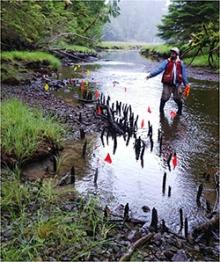Dene Moore
Source - http://www.cbc.ca/news/technology/earliest-sign-of-human-habitation-in-canada-may-have-been-found-1.2775151

The University of Victoria's Bluefin-12S AUV is being off-loaded from the Parks Canada vessel Gwaii Haanas II at the end of the project. The team plans to return next summer for further investigation. (University of Victoria/Canadian Press)
Researchers using a robotic underwater vehicle off British Columbia's northern coast believe they may have found the earliest evidence of human habitation in Canada.
Unfortunately, the site that could date back almost 14,000 years lies beneath hundreds of metres of water in the ocean around the Haida Gwaii archipelago.
Archaeologist Quentin Mackie from the University of Victoria and his team returned earlier this month from a research trip to the archipelago, where they used the autonomous underwater vehicle to scan the sea floor in search of evidence of ancient civilization.
"We're not quite ready to say for sure that we found something," he said. "We have really interesting-looking targets on the sea floor that, as an archeologist, they look like they could be cultural."
Mackie has studied the area for 15 years and came to believe that ancient residents would have harvested salmon near the coast of what was then a single island that stretched well across Hecate Strait toward the mainland.
At the time, the sea level was about 100 metres lower than it is today and the main island of the archipelago was twice as large.
Stone tools or evidence of campfires would not be possible to see on the ocean bottom: they're too small, Mackie said.
"But we had this idea that if people were harvesting salmon in the rivers... they might have been building fish weirs," he said.
Armed with detailed scans of the sea floor and with the help of Parks Canada and its research vessel, Mackie and his colleagues set out to search.
For as many as 12 hours a day for 10 days, the torpedo-like AUV used sonar to survey 25 kilometres of what were once riverbeds.
He's far from certain, but Mackie is hopeful the images show at least one stone weir — a man-made channel used to corral fish. The scan suggests a wall of large stones was placed in a line at a right angle to the stream, a fishing technique used by many other ancient cultures, including those that thrived along B.C's coasts.
"That's pretty much the exact archetype of what we were looking for," he said.
Based on radiocarbon dating from another archeological site on the island, the weir could date back 13,800 years.
Alison Proctor, a research engineer from the university's ocean technology lab, programmed and operated the AUV for this expedition and during the 2012 search for the Franklin expedition in the Arctic.
She agreed there was nothing definite about the apparent find, but "it gives us a reason to go on... go back and try to prove something conclusively," she said.

A 2,500-year-old wood and stone fish weir is mapped out by researchers in Gwaii Haanas. Archeologists say they believe they have found a much older weir in an area that could have been a village, but is now underwater. (Parks Canada)
Theory matches oral histories
A geologist will now study the images to ensure the rocks are not a natural formation, then the team will return next summer to take samples of the sediment near the site and to look for stone tools.
Ernie Gladstone, the superintendent of Gwaii Haanas, said such research helps Parks Canada and the Haida manage the land and sea of the archipelago, which includes a UNESCO world heritage site at SGang Gwaay.
Mackie's theory matches up with the oral history of the First Nations, Gladstone said.
"We know that people have lived in the Gwaii Haanas area for many thousands of years," he said.
But "much of the very early history of Gwaii Haanas and Haida Gwaii lies below the waters of Hecate Strait."
If the current exploration site pans out, it's a testament to the incredible resilience of the Haida, Mackie said.
"The village that you were born in would be underwater by the time you died," he said. "And they're able to take all this change in stride, and they probably even thrived on that."